Mises, Ludwig von. Human Action: A Treatise on Economics
Подождите немного. Документ загружается.

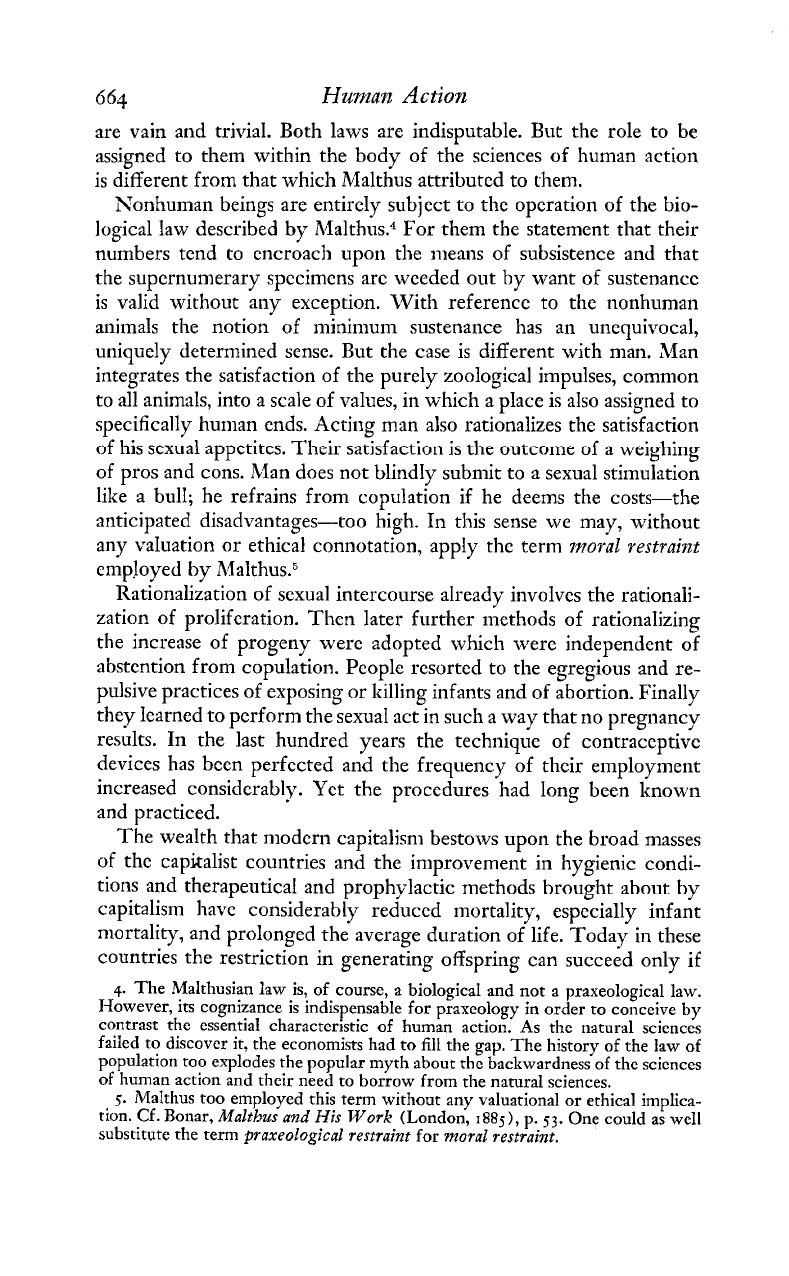
664
Human
Action
are vain and trivial. Both laws are indisputable. But the role to be
assigned to them within the body of the sciences of human action
is different from that which Malthus attributed to them.
Nonhuman beings are entirely subject to the operation of the bio-
logical law described by Malthus.' For them the statement that their
numbers tend to encroach upon the means of subsistence and that
the supernumerary
specimens
arc weeded out by want of sustenance
is valid without any exception. With reference to the nonhuman
animals the notion
of
minimum sustenance has an unequivocal,
uniquely determined sense. But the case is different with man. Man
integrates the satisfaction of the purely zoological impulses, common
to all animals, into a scale of values, in which a place is also assigned to
specifically human ends. Acting man also rationalizes the satisfaction
of his sexual appetites.
Their
satisfaction is the outcome of
a
weighing
of pros and cons. Man does not blindIy submit to a sexual stimulation
like a bulI; he refrains from copulation if he deems the costs-the
anticipated disadvantages-too high. In this sense we may, without
any valuation or ethical connotation, apply the term
7~70ral restraint
employed by Rilalth~s.~
Rationalization of sexual intercourse already involves the rationali-
zation of proliferation. Then later further methods of rationalizing
the increase of progeny were adopted which were independent of
abstention from copulatiol~. People resorted to the egregious and re-
pulsive practices of exposing or killing infants and of abortion. Finally
they learned to perform the sexual act in such a way that no pregnancy
resblts. In the last hundred years the technique of contraccptivc
devices has been perfected and the frequency of their employment
increased considerably. Yet the procedures had long been ltnown
and practiced.
The wealth that modern capitalism bestows upon the broad masses
of the capitalist countries and the improvement in hygienic condi-
tions and therapeutical and prophylactic methods brought about by
capitalism have considerably reduced mortality, especially infant
mortality, and prolonged the average duration of life. Today in these
countries the restriction in generating offspring can succeed only if
4.
The Malthusian law is, of course, a biological and not a praxeological law.
I-Iowever, its cognizance is indispensable for praxeology in order to conceive by
contrast the essential characteristic of human action. As the natural sciences
failed to discover it, the economists had to fill the gap. The history of the law of
populatiori too explodes the popular myth about the backwardness of the sciences
of human action and their need to borrow from the natural sciences.
5.
MaIthus too employed this term without any valuational or ethical implica-
tion. Cf. Ronar,
Malthw and His Work
(London, 1885), p.
53.
One could as well
substitute the term
praxeological restraint
for
moral restraint.
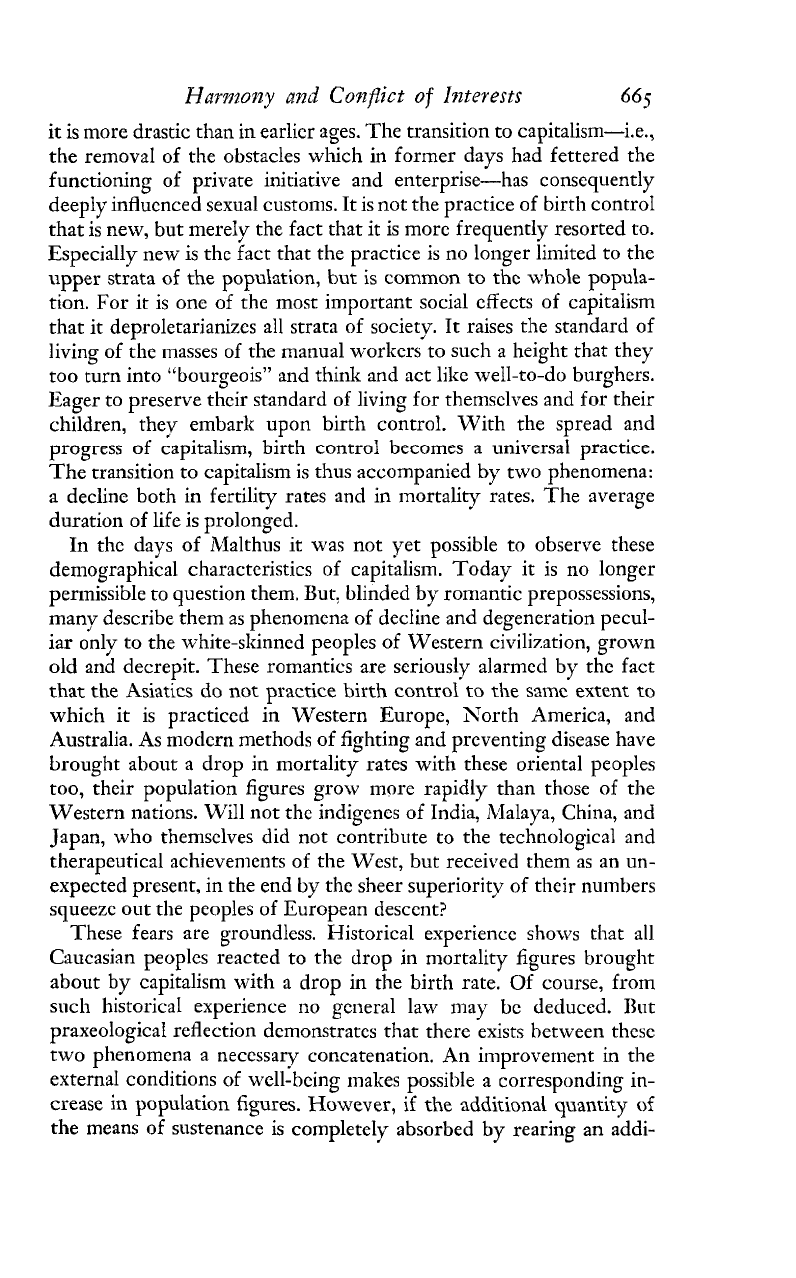
Harmony and Conflict
of
Interests
665
it is more drastic than in earlicr ages. The transition to capitalism-i.e.,
the removal of the obstacles which in former days had fettered the
functioning of private initiative and enterprise-has consequently
deeply influenced sexual customs. It is not the practice of birth controI
that is new, but merely the fact that it is more frequently resorted to.
Especially new is the fact that the practice is no longer limited to the
upper strata of the population, but is common to the whole popula-
tion. For it is onc of the most important social effects of capitalism
that it deproletarianizes all strata of society. It raises the standard of
living of the masses of the manual workers to such a height that they
too turn into "bourgeois" and think and act like well-to-do burghers.
Eager to preserve their standard of living for
themselves
and for their
children, they embark upon birth control. With the spread and
progress of capitalism, birth control becomes a universal practice.
The transition to capitalism is thus accompanied by two phenomena:
a decline both in fertility rates and in mortality rates. The average
duration of life is prolonged.
In the days of Malthus it was not yet possible to observe these
demographical characteristics of capitalism. Today it is no longer
permissible
to question them. But: blinded by romantic prepossessions,
many describe them as phenomena of decline and degeneration pecul-
iar only to the white-skinned peoples of Western civilization, grown
old and decrepit. These romantics are seriously alarmed by the fact
that the Asiatics do not practice birth controf to the same extent to
which it is practiced in Western Europe, North America, and
Australia. As modern methods of fighting and preventing disease have
brought about a drop in mortality rates with these oriental peoples
too, their population figures grow more rapidly than those of the
Western nations. Will not the indigencs of India, Malaya, China, and
Japan, who themselves did not contribute to the technological and
therapeutical achievements of the West, but received them as an un-
expected present, in the end
by
the sheer superiority of their numbers
squeeze out the peoples of European descent?
These fears are groundless. Historical esperiencc shows that all
Caucasian peoples reacted to the drop in mortality figures brought
about by capitalism with a drop in the birth rate. Of course, from
such historical experience no general law may bc deduced. Bat
praxeologicaf reflection demonstrates that there exists between these
two
phenomena
a necessary concatenation. An improvement in the
external conditions of we1l:being makes possible a corresponding in-
crease in population figures. However, if the additional quantity
of
the means of sustenance is completely absorbed by rearing an addi-
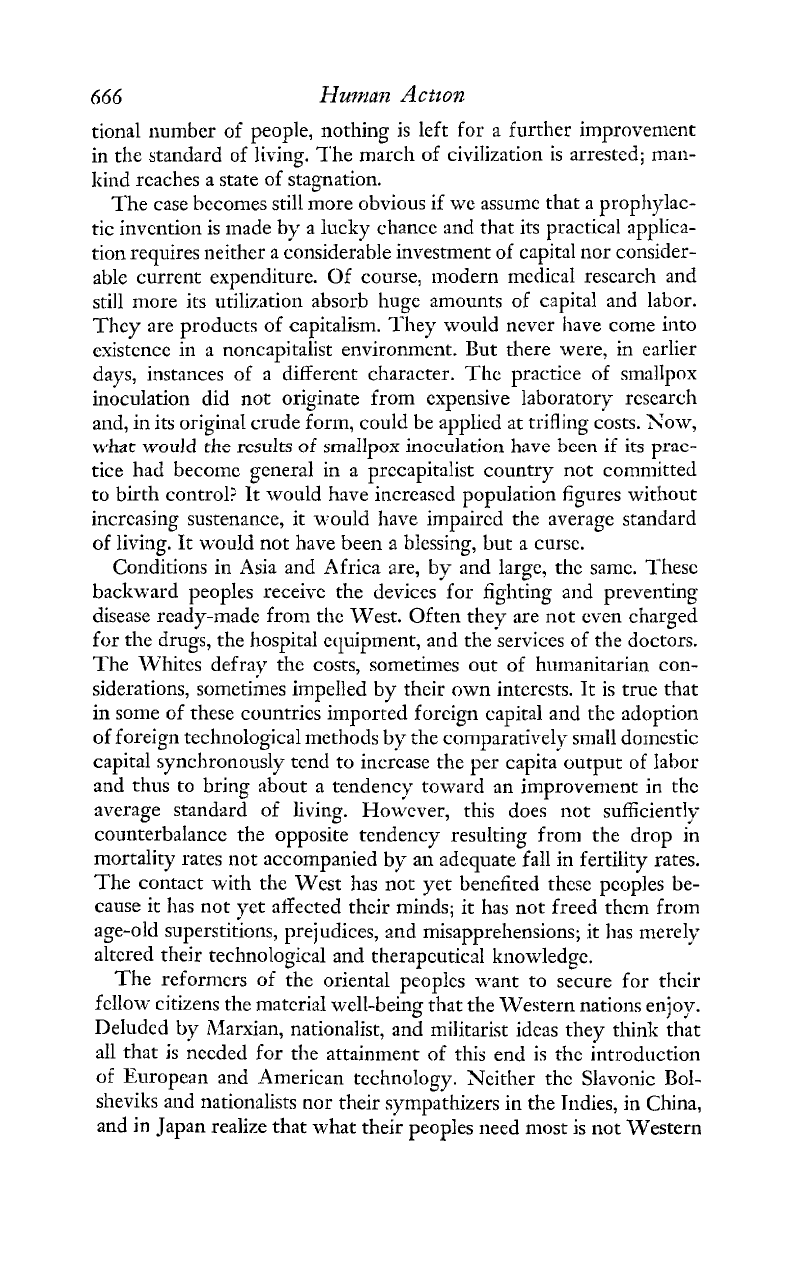
666
Human
Actzon
tional number of people, nothing is left for a further improvement
in the btandard of living. The march of civilization is arrested; man-
kind rcaches a state of stagnation.
?'he case bccomes still more obvious if we assurnc that a prophylac-
tic invcntion is made
by
a lucky chancc and that its practical applica-
tion requires neither a considerable investment of capital nor consider-
able current expenditure.
Of
course, modern medical rescarch and
still more its utilization absorb huge amounts of capital and labor.
Thcy are product5 of capitalism. They would nevcr have come into
cxistcncc in a noncapitalist
environment.
But there were, in earlier
days, instances of a different character. The practice of smallpox
inoculation did not originate from
expensive
laboratory rcscarch
and, in its original crude form, could be applied at trifling costs. Sow,
what would the rcsults of smallpox inoculation have bcen if its prac-
tice had become gcneral in a prccapitalist country not comn.litted
to birth control? It would have increascd population figures without
incrcasing sustenance, it would have impaircd the average standard
of living. It would not have been a blessing, but a cursc.
Conditions in Asia and Africa are, by and large, thc samc. These
backward peoples receivc the devices for fighting and preventing
disease ready-madc from thc West. Often they are not even charged
for the drugs, the hospital cquipment, and theservices of the doctors.
The Whitcs defray thc costs, sometimes out of humanitarian con-
siderations, somcti&es iinpclled by thcir own intcrcsts. It is true that
in some of thcse countries imported forcign capital and the adoption
of foreign technological methods by the comparatively sn~all dorncstic
capital synchronously tend to increase the per capita output of labor
and thus to bring about a tendency toward an improvenlent in the
average standard of living. However, this does not suficiently
counterbalancc the opposite tendency resulting from the drop in
mortality rates not accompanied by an adequate fall in fertility rates.
The contact with the West has not yet benefited thcse peoples be-
cause it has not yet affected thcir minds; it has not freed them from
age-old superstitions, prejudices, and misapprehensions; it has rnerely
altcred their technological and therapcutical knowledge.
The
reformers
of the oriental pcoplcs want to secure for thcir
fcllow citizens the matcrial well-being that the Western nations enjoy.
Deluded
by
Marxian, nationalist, and militarist ideas they think that
all that is ;ceded for the attainment of this end is the introduction
of European and American tcchnology. Ncither thc Slavonic Bol-
sheviks and nationalists nor their sympathizers in the Indies, in China,
and in Japan realize that what their peoples need most is not Western
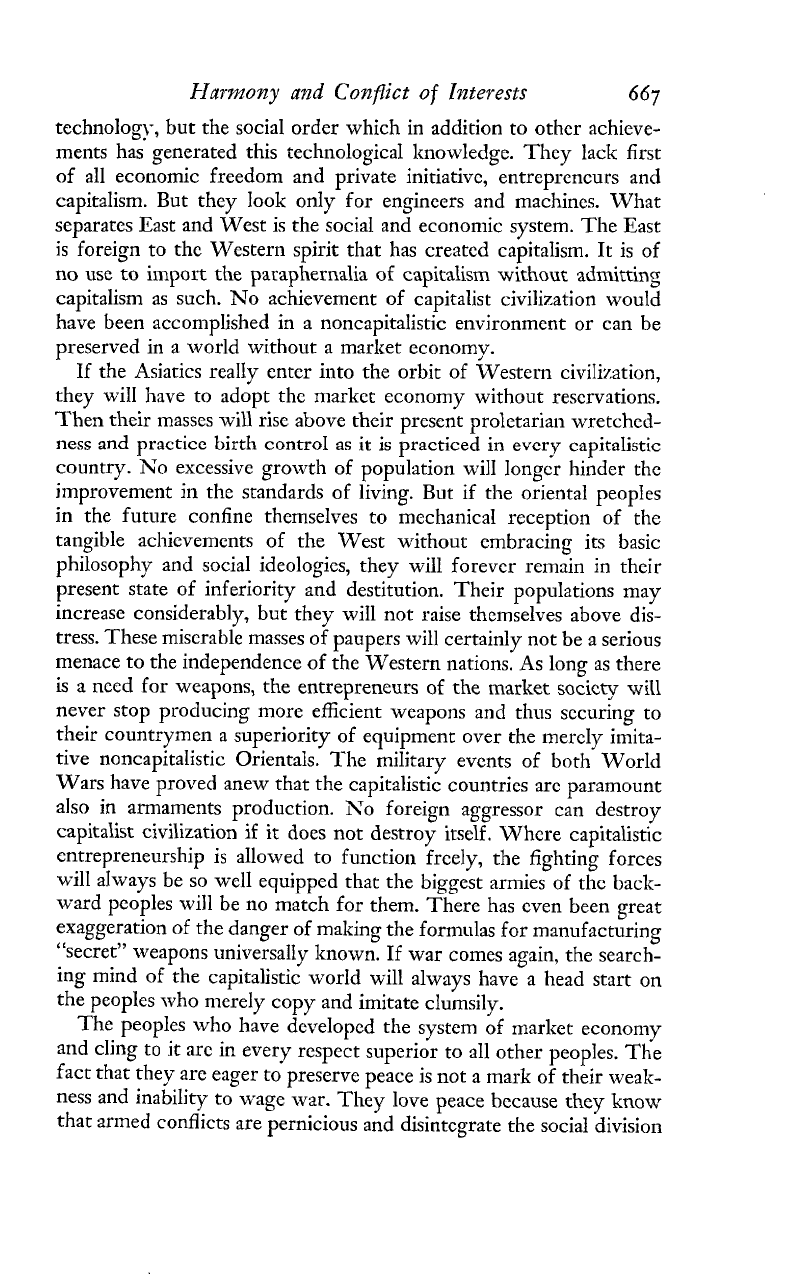
Flu~wzony
and
Conflict of Interests
667
technolog?-, but the social order which in addition to other achieve-
ments has generated this technological knowledge. They lack first
of all economic freedom and private initiative, entrepreneurs and
capitalism. But they look only for engineers and machines. What
separates East and West is the social and economic system. The East
is foreign to the Western spirit that has created capitalism. It is of
no use to import the paraphernalia
of
capitalism without admitting
capitalism as such. T\To achievement of capitalist civilization would
have been accon~plished in a noncapitalistic environment or can be
preserved in a world withottt a market economy.
If the Asiatics really enter into the orbit of Western civiIization,
they will have to adopt the market economy without reservations.
Then their masses will rise above their present proletarian wretched-
ness and practice birth control as it is practiced in every capitalistic
country. No excessive growth of population wilI longer hinder the
improvement in the standards of living. But if the oriental peoples
in the future confine themselves to mechanical reception of the
tangible achievements of the West without embracing its basic
philosophy and social ideologies, they will forever remain in their
present state of inferiority and destitution. Their populations may
increase considerably, but they will not raise themselves above dis-
tress. These miserable masses of paupers will certainly not be a serious
menace to the independence of the Western nations. As long as there
is
a need for weapons,
the
entrepreneurs
of
the market society
will
never stop producing more efficient weapons and thus securing to
their countrymen
a
superiority of equipment over the merely imita-
tive noncapitalistic Orientals. The military events of both World
Wars have proved anew that the capitalistic countries arc paramount
also in armaments production. No foreign aggressor can destroy
capitalist civilization
if
it does not destroy itself. Where capitalistic
entrepreneurship is allowed to function freely, the fighting forces
will always be so well equipped that the biggest armies of the back-
ward peoples will be no match for them. There has even been great
exaggeration
of
the danger of making the forn~ulas for manufacturing
<I
secret" weapons universally known. If war comes again, the search-
ing mind of the capitalistic world will always have a head start on
the peoples who merely copy and imitate clumsily.
The peoples who have developed the system of market economy
arid cling to it arc in every respect superior to all other peoples. The
fact that they are eager to preserve peace is not a mark of their weak-
ness and inability to wage war. They love peace because they know
that armed conflicts are pernicious and disintegrate the social division
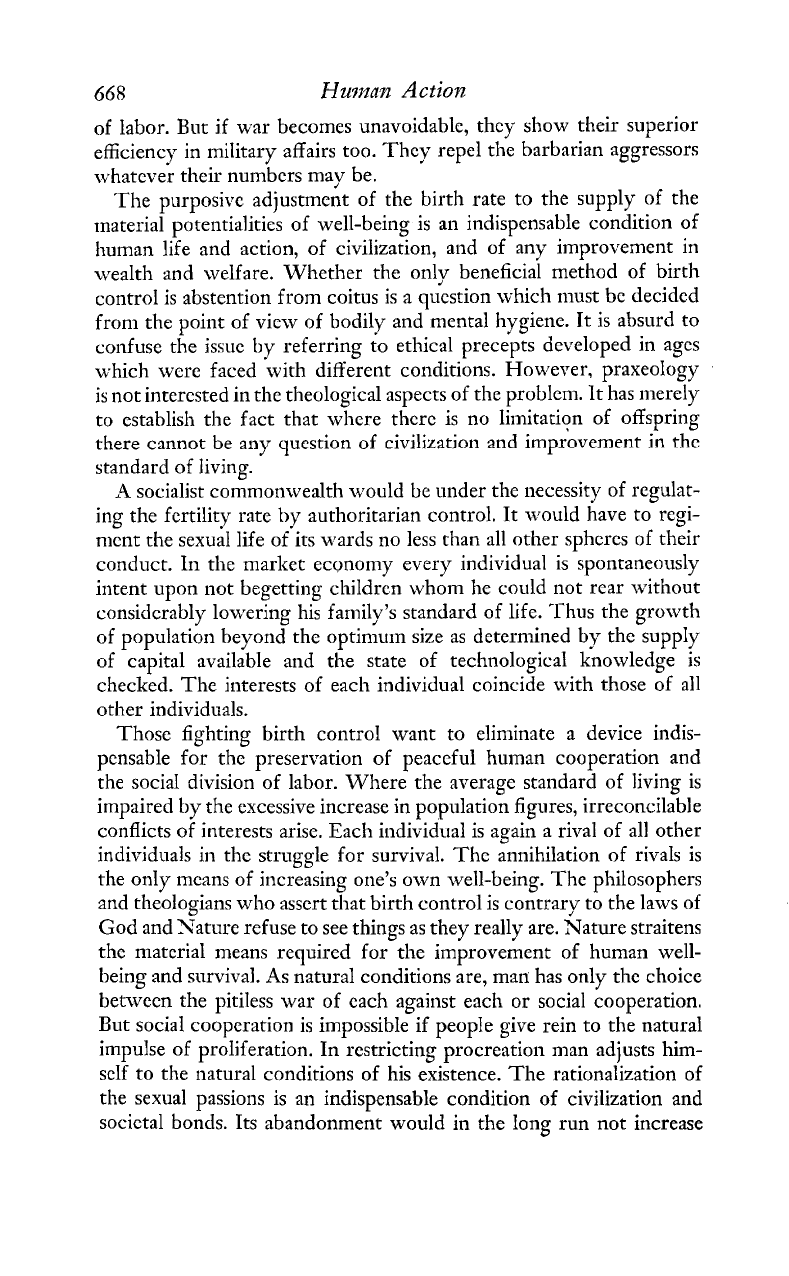
668
Human
Action
of labor. But if war becomes unavoidable, they show their superior
efficiency in military affairs too. Thcy repel the barbarian aggressors
whatcve; their numbers may be.
The purposive adjustment of the birth rate to the supply of the
material potentialities of well-being is an indispensable condition of
human life and action, of civilization, and of any improvement in
wealth and welfare. Whether the only beneficial method of birth
control is abstention from coitus is a question which must be decided
from the point of view of bodily and mental hygiene. It is absurd to
confuse the issue by referring to ethical precepts developed in ages
which were faced with different conditions. However, praxeology
is not interested in the theological aspects of the problem. It has merely
to establish the fact that where there is no limitation of offspring
there cannot be any question of civilization and improvement in the
standard of living.
A
socialist commonwealth would be under the necessity of regulat-
ing the fertility rate by authoritarian control. It would have to regi-
ment the sexual life of its wards no less than all other spheres of their
conduct.
In
the market economy every individual is spontaneously
intent upon not begetting children whom he could not rear without
considerably lowering his family's standard of life. Thus the growth
of population t)eyond the optimum size as determined by the supply
of capital available and the state of technological knowledge is
checked. The interests of each individual coincide with those of all
other individuals.
Those fighting birth control want to eliniinate a device indis-
pensable for the preservation of peaceful human cooperation and
the socia1 division of labor. Where the average standard of living is
impaired by the excessive increase in population figures, irreconcilable
conflicts of interests arise. Each individual is again a rival of all other
individuals in the struggle for survival. The annihilation of rivals is
the only mans of increasing one's own well-being. Thc philosophers
and theologians who assert that birth control is contrary to the laws of
God and Nature refuse to see things as they really are. Nature straitens
the material means required for the improvement of human well-
being and survival. As natural conditions are, man has only the choice
betsvccn the pitiless war of each against each or social cooperation.
But social cooperation is impossible if peopIe give rein to the natural
impulse of proliferation.
In
restricting procreation man adjusts him-
self to the natural conditions of his existence. The rationalization of
the sexual passions is an indispensable condition of civilization and
societal bonds. Its abandonment would in the long run not increase
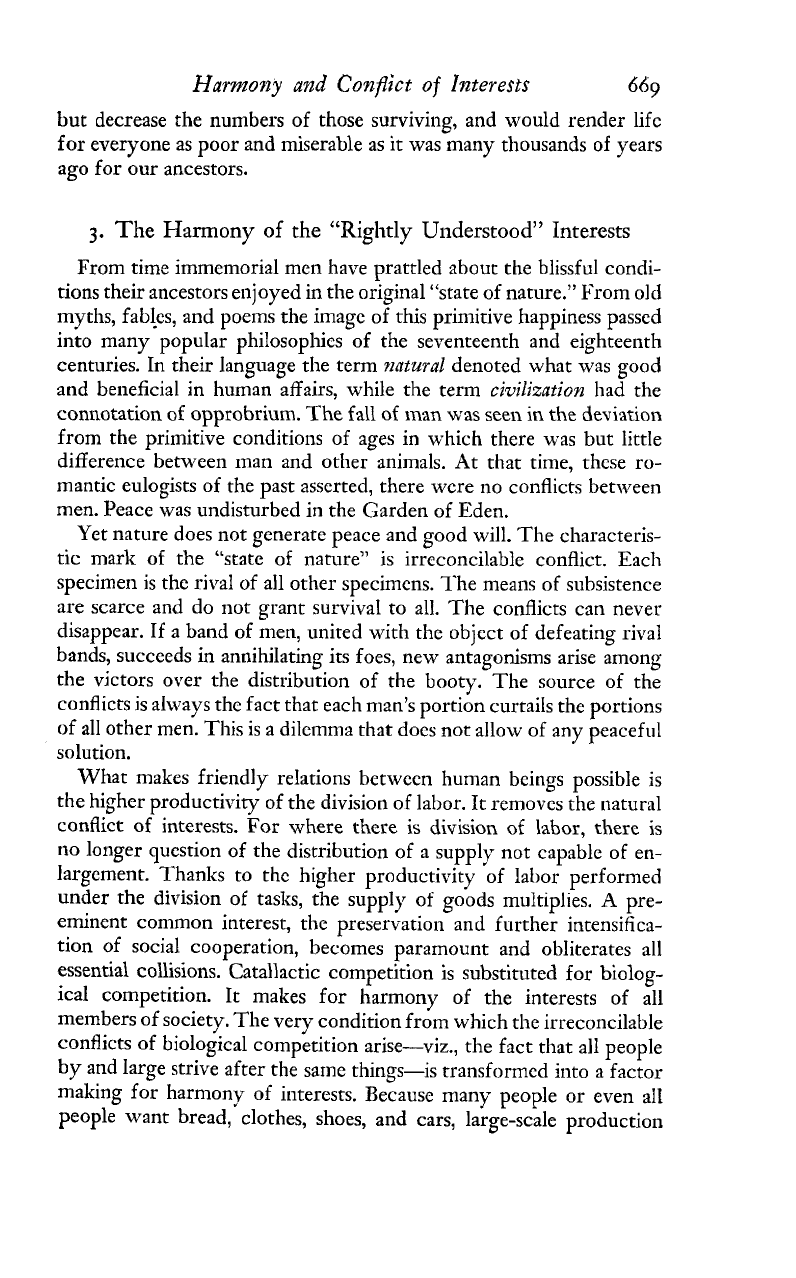
Harmony
and
Conflict
of
Interests
669
but decrease the numbers of those surviving, and would render life
for everyone as poor and miserable as it was many thousands of years
ago for our ancestors.
3.
The Harmony of the "Rightly Understood" Interests
From time immemorial men have prattled about the blissful condi-
tions their ancestors enjoyed in the original "state of nature." From old
myths, fabies, and poems the image of this primitive happiness passed
into many popular philosophies of the seventeenth and eighteenth
centuries. In their language the term
natural
denoted what was good
and beneficial in human affairs, while the term
civilization
had the
connotation
of
opprobrium. The fall of man was seen
in
the
deviation
from the primitive conditions of ages in which there was but little
difference between man and other animals. At that time, these ro-
mantic eulogists of the past asserted, there were no conflicts between
men. Peace was undisturbed in the Garden of Eden.
Yet nature does not generate peace and good will. The characteris-
tic mark of the "state of nature" is irreconcilable conflict. Each
specimen is the rival of all other specimens. The means of subsistence
are scarce and do not grant survival to all. The conflicts can never
disappear. If a band of men, united with the object of defeating rival
bands, succeeds in annihilating its foes, new antagonisms arise among
the victors over the distribution of the booty. The source of the
conflicts is always thc fact that each man's portion curtails the portions
of all other men. This is a dilemma that does not allow of any peaceful
solution.
What makes friendly relations between human beings possible is
the higher productivity of the division of labor. It removes the natural
conflict of interests. For where there is division of labor, therc
is
no longer question of the distribution of a supply not capable of en-
largement. Thanks to thc higher productivity of labor performed
under the division of tasks, the supply of goods multiplies.
A
pre-
eminent common interest, the preservation and further intensifica-
tion of social cooperation, becomes paramount and obliterates all
essential collisions. Catallactic competition is substituted for biolog-
ical competition. It makes for harmony of the interests of all
members of society. The very condition from which the irreconcilable
conflicts of biological competition arise-viz., the fact that
all
people
by and large strive after the same things-is transformed into a factor
making for harmony of interests. Because many people or even all
people want bread, clothes, shoes, and cars, large-scale production
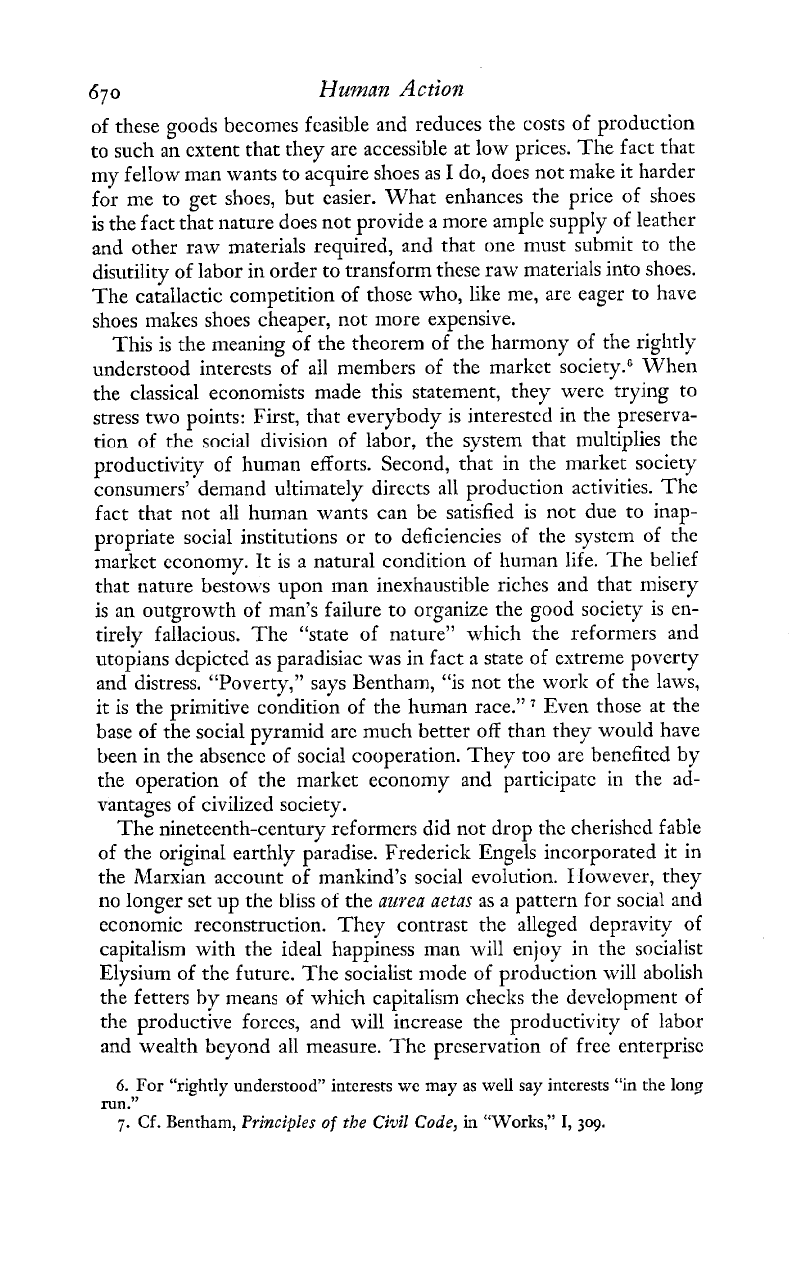
670
Human
Action
of these goods becomes fcasible and reduces the costs of production
to such an cxtent that they are accessible at low prices. The fact that
my fellow man wants to acquire shoes as
I
do, does not make it harder
for me to get shoes, but easier. What enhances the price of shoes
is the fact that nature does not provide a more ample supply of leather
and other raw materials required, and that one must submit to the
disutility of labor in order to transform thesc raw materials into shoes.
The catallactic competition of those who, like me, are eager to have
shoes makes shoes cheaper, not more expensive.
This is the meaning of the theorem of the harmony of the rightly
understood interests of all members of the market so~iety.~ When
the classical economists made this statement, they werc trying to
stress two points: First, that everybody is interested in the preserva-
tion of the social division of labor, the systern that multiplies the
productivity of human efforts. Second, that in the market society
consumers' demand ultimately directs all production activities. The
fact that not all human wants can be satisfied is not due to inap-
propriate social institutions or to deficiencies of the system of the
market economy. It is a natural condition of human life. The belief
that nature bestows upon man inexhaustible riches and that misery
is an outgrowth of man's failure to organizc the good society is cn-
tirely fallacious. The "state of nature" which the reformers and
utopians dcpicted as paradisiac was in fact a state of extreme poverty
and distress. "Poverty," says Bentham, "is not the work of the laws,
it is the primitive condition of the human race." Even those at the
base of the social pyramid arc much better off than they would have
been in the absence of social cooperation. They too arc benefited by
the operation of the market economy and participate in the ad-
vantages of civilized society.
The nineteenth-century rcformers did not drop thc cherishcd fable
of the originaI earthly paradise. Frederick Engels incorporated it in
the Marxian account of mankind's social evolution. Ilowever, they
no ionger set up the bliss of the
aurea aetas
as a pattern for sociai and
economic reconstruction. They contrast the alleged depravity of
capitalism with the ideal happiness man will enjoy in the socialist
Elysium of the future. The socialist mode of produ&on will abolish
the fetters by means of which capitalism checks the development of
the productive forces, and will increase the productivity of labor
and wealth beyond all measure. The prcservation of free enterprise
6.
For "rightly understood" interests we
may
as well
say
interests
"in
the
long
run."
7.
Cf.
Bentham,
Principles
of the
Civil
Code,
in
"Works,"
I,
jog.
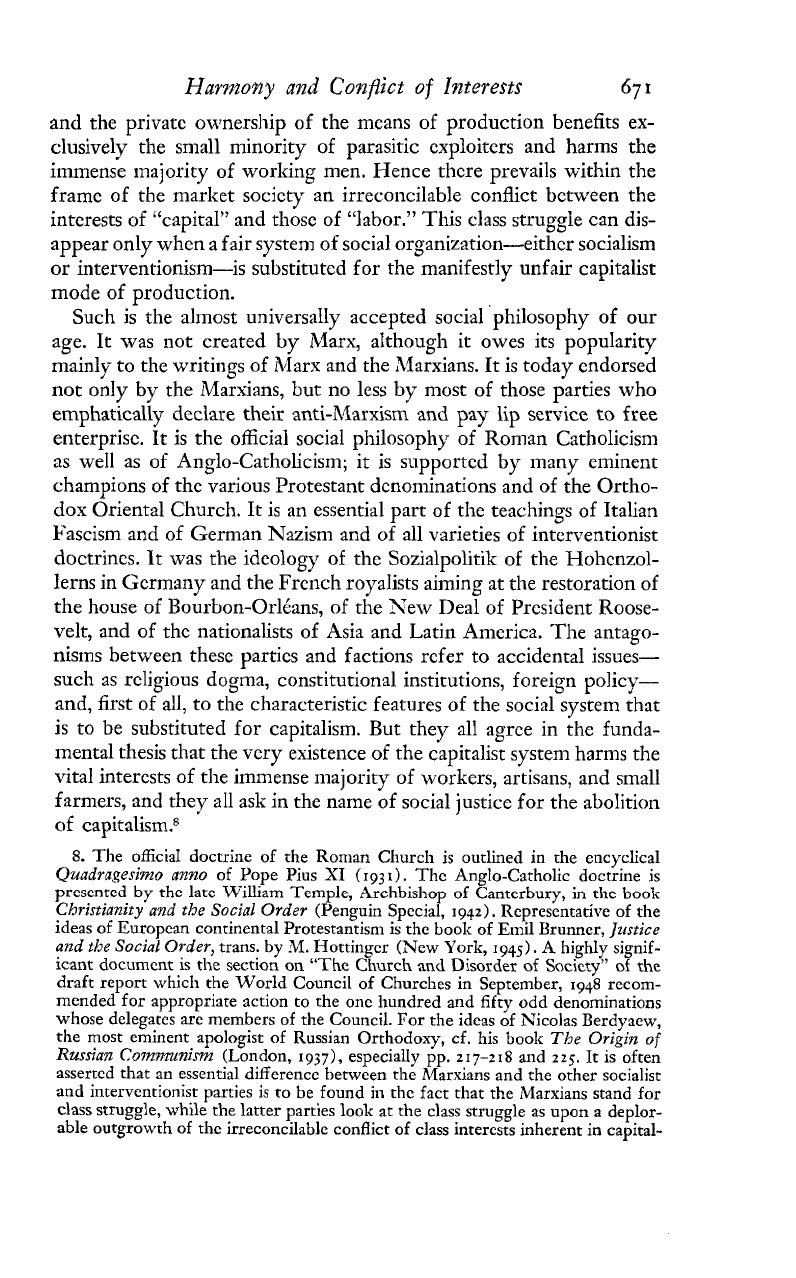
Harmony
and
Conflict
of
interests
671
and the private oumership of the means of production benefits ex-
clusively the small minority of parasitic cxploitcrs and harms the
immense majority of working men. Hence there prevails within the
frame of the market society an irreconcilable conflict between the
interests of "capital" and thosc of "labor." This class struggle can dis-
appear only when a fair system of social organization-either socialism
or interventionism-is substituted for the manifestly unfair capitalist
mode of production.
Such is the alrnost universally accepted social philosophy of our
age.
It
was not created by Marx, although it owes its popularity
mainly to the writings of Marx and the Ailarxians. It is today endorsed
not only by the Marxians, but no less by most
of
those parties who
emphatically declare their anti-Marxism and
pay
lip
service
to
free
enterprise. It is the official social philosophy of Roman CathoIicism
as well as of Anglo-Catholicism; it is supported by many eminent
champions of the various Protestant denominations and of the Ortho-
dox Oriental Church. It is an essential part of the teachings of Italian
Fascism and of German Nazism and of all varieties of interventionist
doctrines. It was the ideology of the Sozialpolitik of the Hohcnzol-
lerns in Germany and the French royalists aiming at the restoration of
the house of Bourbon-OrlCans, of the New Ileal of President Roose-
velt, and of the nationalists of Asia and Latin America. The antago-
nisms between these parties and factions refer to accidental issues-
such as religious dogma, constitutional institutions, foreign policy-
and, first of all, to the characteristic features of the social system that
is to be substituted for capitalism. But they all agree in the funda-
mental thesis that the very existence of the capitalist system harms the
vital interests of the immense majority of workers, artisans, and small
farmers, and they all ask in the name of social justice for the abolition
of ~apitalism.~
8.
The officiaI doctrine of the Roman Church is outlined in the encyclical
Quadragesirno anno
of Pope Pius
XI
(1931). The Anglo-Catholic doctrine is
presented by the late William Temple, Archbishop of Canterbury, in the book
Christianity and the Social Order
(Penguin Special, 1942). Representative of the
ideas of European continental Protestantism is the book of Elnil Brunner,
Justice
and the Social Order,
trans. by
M.
Hottingcr (New York, 1945).
A
highly signif-
icant document is the section on "The
Church
2nd
Disorder
of Society"
of
the
draft report which the World Council of Churches in September, 1948 recom-
mended for appropriate action to the one hundred and fifty odd denominations
whose delegates are members of the Council. For the ideas of Nicolas Berdyaew,
the most eminent apologist of Russian Orthodoxy, cf. his book
The Origin of
Russian Co7nmnim
(London, 1937)~ especially pp. 217-2 18 and 225. It is often
asserted that an essential differencc between the Marxians and the other socialist
and interventionist parties is to be found in the fact that the Marxians stand for
class struggle, while the latter parties look at the class struggle as upon
a
deplor-
able outgrowth of the irreconcilable conflict of class interests inherent in capital-
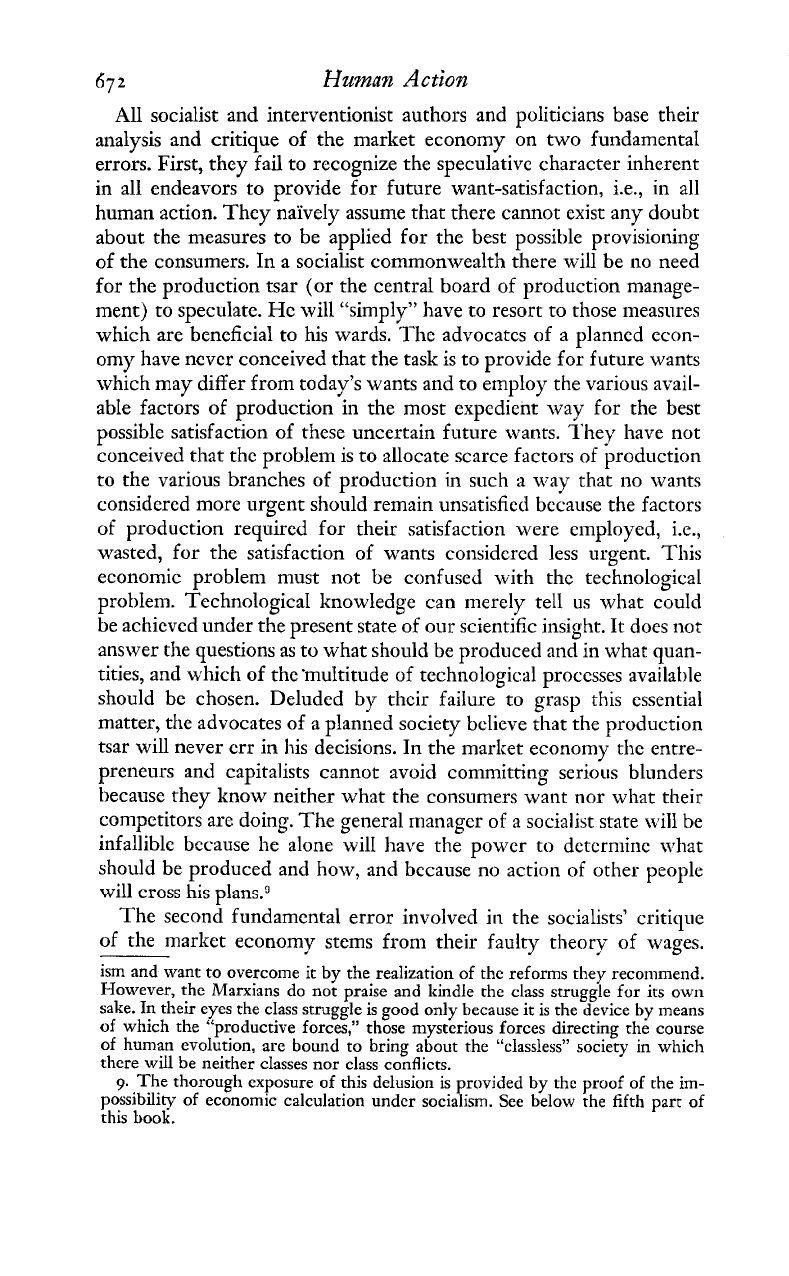
672
Human
Action
All socialist and interventionist authors and politicians base their
analysis and critique of the market economy on two fundamentaI
errors. First, they fail to recognize the speculative character inherent
in all
endeavors
to provide for future want-satisfaction, i.e., in all
human action. They na'ively assume that there cannot exist any doubt
about the measures to be applied for the best possible provisioning
of the consumers. In a socialist commonwealth there will be no need
for the production tsar (or the central board of production manage-
ment) to speculate. He will "simply" have to resort to those measures
which are beneficial to his wards. The advocates of a planned econ-
omy have never conceived that the task is to provide for future wants
which may differ from today's wants and to employ the various avail-
abIe factors of production in the most expedient way for the best
possible satisfaction of these uncertain future wants. They have not
conceived that the problem is to allocate scarce factors of
;reduction
to the various branches of production in such a way that no wants
considered more urgent should remain unsatisfied because the factors
of production required for their satisfaction were employed, ix.,
wasted, for the satisfaction of wants considered less urgent. This
economic problem must not be confused with the technological
protdem. TechnologicaI knowledge can merely tell
us
what could
be achieved under the present state of our scientific insight. It does not
answer the questions as to what should be produced and in what quan-
tities, and which of the 'muItitude of technological processes
available
should be chosen. Deluded by their failure to grasp this essential
matter, the advocates of a planned society believe that the production
tsar will never err in his decisions. In the market econon~y the entre-
preneurs and capitalists cannot avoid committing serious blunders
hecause they know neither what the consumers want nor what their
competitors are doing. The general n~anager of a socialist state will be
infallible because he alone wilI have the power to determine what
should be produced and how, and because no action of other people
wl!!
cress
his
p!ans."
The second fundamental error involved in the socialists1 critique
of the market economy stems from their faulty theory of wages.
ism and want to overcome it by the realization of the reforms they recommend.
However, the Marxians do not praise and kindle the class struggle fur its own
sake. In their eyes the class struggle is good only because it is the device by means
of which the "productive forces," those mysterious forces directing rhe course
of human evolution, are bound to bring about the "classless" society in which
there
will
be neither classes nor class conflicts.
9.
The thorough exposure of this delusion is provided by thc proof of the im-
possibility of economic calculation under socialism. See below the fifth part of
this book.
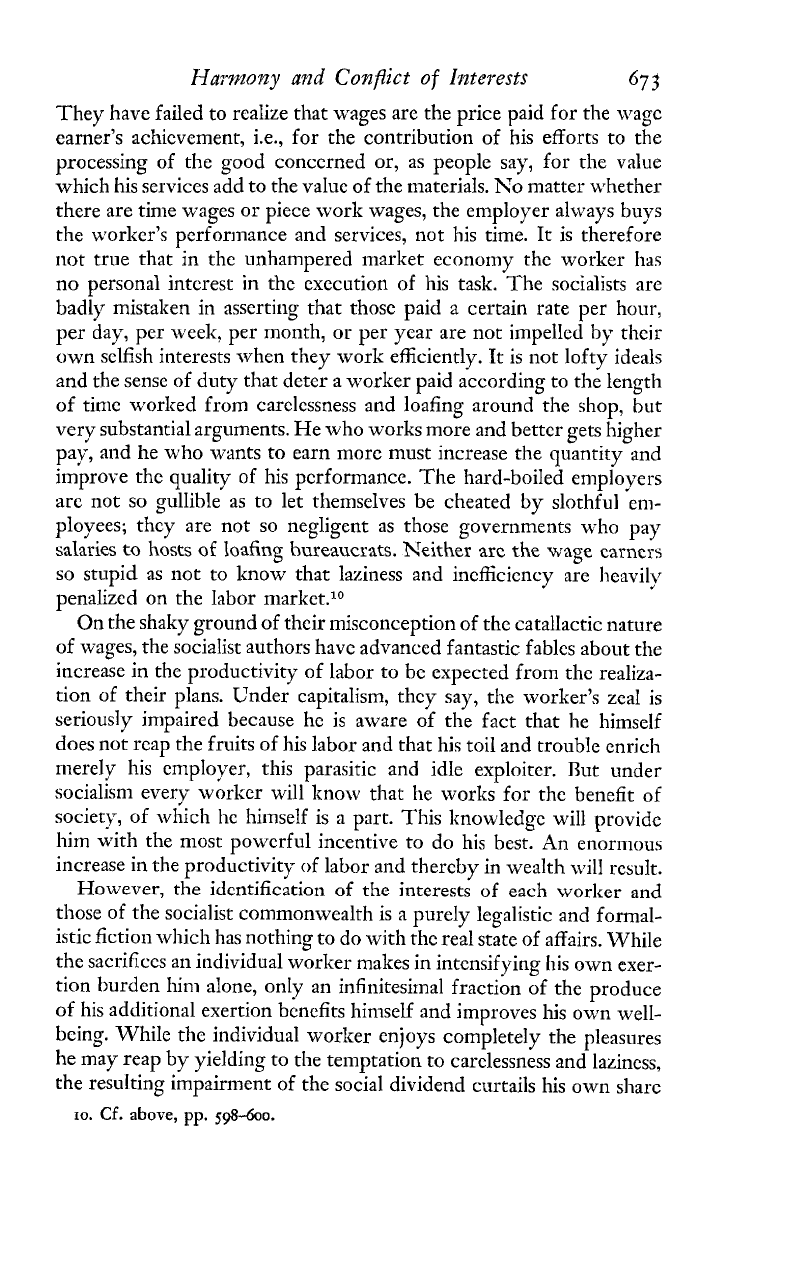
Harmony
and
Conpict
of
Inte~ests
67
3
They have failed to realize that wages are the price paid for the wagc
earner's achicvcment, i.e., for the contribution of his efforts to the
processing of the good conccrned or, as people say, for the value
which his services add to the value of the materials. No matter whether
thcre are time wages or piece work wages, the employer always buys
the worker's performance and services, not his time. It is therefore
not true that in the unhampered market economy the worker has
no personal interest
in
thc execution of his task. The socialists are
badly mistaken in assertiilg that those paid a certain rate per hour,
per day, per week, per month, or per year are not impelled
by
thcir
own selfish interests when they work efficiently. It is not lofty ideals
and the sense of duty that deter a worker paid according to the length
of time worked from carclcssness and loafing around the shop, but
vcry substantial arguments. He who works more and bettcr gets higher
pay, and he who wants to earn more must increase the quantity and
improve the quality of his pcrformance. The hard-boiled enlployers
arc not so gullible as to let themselves be cheated by slothful em-
ployees; they are not so negligent as those governments who pap
salaries to hosts
of
loafing bureaucrats. Neither arc the wage
earners
so stupid as not to know that laziness and incfticicncy are heavily
penalized on the labor markct.1°
On the shaky ground of thcir misconception of the catallactic nature
of wages, the socialist authors havc advanced fantastic fablcs about the
increase in thc productivity of labor to bc expected from the realiza-
tion of their plans. Under capitalism, thcy say, the worker's zeal is
seriously impaired because he is aware of the fact that he himself
does not rcap the fruits of his labor and that his toil and trouble enrich
merely his employer, this parasitic and idle exploiter. nut under
socialism every worker will know that he works for the benefit of
society, of which he himself is a part. This knowledge will provide
him Gith the most powerful incentive to do his best. An enormous
increase in the productivity
of
labor and thereby in wealth will result.
However, the idcntification of the interests of each worker and
those of the socialist commonwealth is a purely leplistic and formal-
istic fiction which has nothing to do with the real state of affairs. JVhile
the
sacrifices
an individual worker makes in intensifying his own exer-
tion burdcn
him
alone, only an infinitesimal fraction of the produce
of his additional exertion benefits himself and improves his own well-
being. While thc individual worl~er enjoys completely the pleasures
he may reap by yielding to the temptation to carclessness and ladness,
the resulting impairment of thc social dividend curtails his own sharc
10.
Cf.
above,
pp.
598430.
